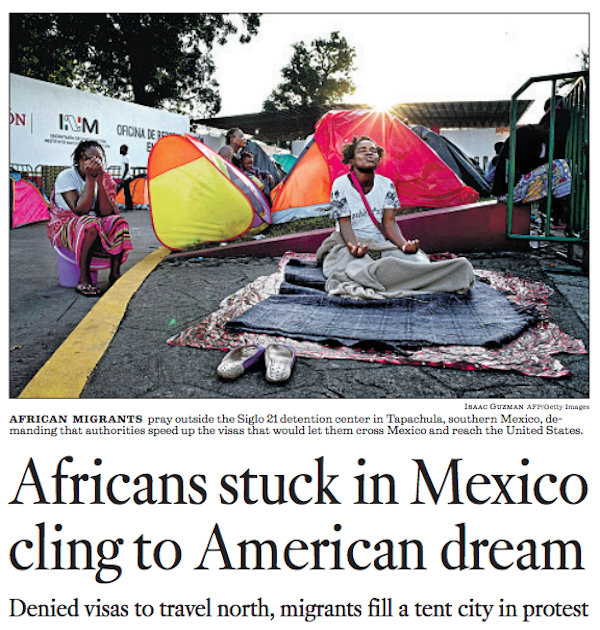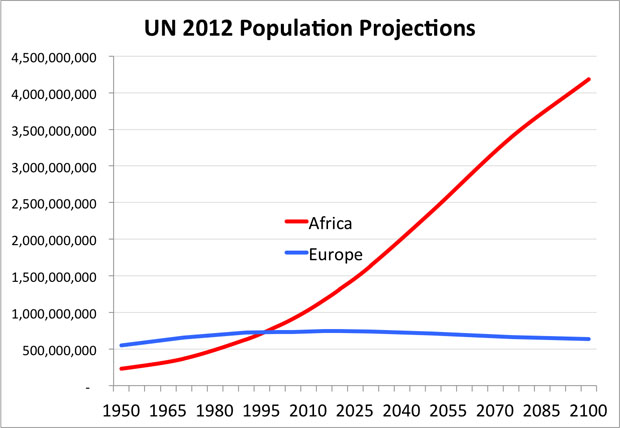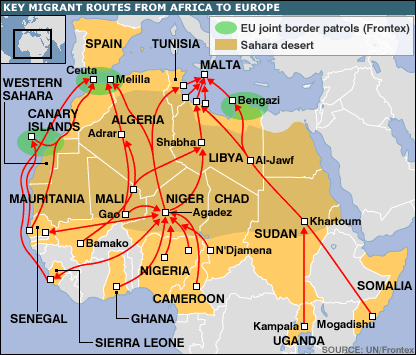One seriously bad thing about African aliens is there’s a billion more where they came from.
Sunday’s Los Angeles Times had the usual sob [...]]]>
One seriously bad thing about African aliens is there’s a billion more where they came from.
Sunday’s Los Angeles Times had the usual sob story presentation on the front page with plenty of boo hooey stories of alleged suffering — so predictable.

Here’s a snapshot from the story, showing a masked man with a cellphone, one of dozens protesting who “demand” visas to travel to the US.

Why can’t they fix their own countries? The United States wasn’t created great — it took years of work to make it so. But aliens want to walk right in and get a full tray of freebies.
In the text below, note the “record 4,779 migrants from Africa” in the first seven months of 2019, a near quadrupling of the same period last year — this is not the direction we want.
America needs Zero foreigners from anywhere because smart machines will be doing much of the work very soon.
]]>African migrants stuck in southern Mexico, their American dream on hold, Los Angeles Times, September 22, 2018
“Africa weeps. Free us.”
That’s the message handwritten in French and Spanish on a protest banner at a tent city here in the southernmost tip of Mexico.
The tents belong to some 250 African nationals who crossed jungles, forded rivers, sneaked across borders and dodged militias and thieves to get here in hopes of eventually reaching the United States. But now they are stuck, because Mexico has denied them the travel visas necessary to proceed north.
Mexican national guard troops and riot police keep close watch over the multi-hued camp, where mosquitoes swarm in puddles. Rain and a fetid stream provide cooking water and many complain of rashes, stomach cramps and other ailments.
“We are fed up,” said Diop Abou, 33, a native of the northwest African nation of Mauritania. “None of us want to be here in this miserable place.”
In the saga of migrants trying to reach the United States, the dominant narrative of late features Central Americans, who account for the vast majority of the 100,000 foreigners whom Mexico has deported this year under pressure from the Trump administration to prevent them from reaching the U.S. border.
But Mexico’s effort to accommodate Washington — and avoid tariffs that Trump threatened to impose — has also targeted thousands of other foreigners, including more than 1,000 Africans who have amassed in southern Mexico over the last several months.
The tent city was erected in protest more than a month ago at the entrance of Tapachula’s federal immigrant detention center, which is called Siglo 21, or 21st Century.
The lockup is reserved primarily for people awaiting deportation, mostly Central Americans.
Mexican authorities apprehended a record 4,779 migrants from Africa in the first seven months of this year — nearly four times the number detained during the same period in 2018 — but deported only two.
The difficulty is that many African countries have no embassies or consular representatives here, and some of the migrants possess no verifiable identification. And so the majority remain stranded.
Those interviewed here said they fled violence, persecution and poverty, ethnic and religious strife and political repression back in their homelands. (Continues)
Enormous population growth is forecast for Africa, where problems like soil depletion are already being exacerbated by too many people needing food resources.

Europe needs to understand that the surge of illegal immigration is not a temporary thing and will continue as long as Europeans allow it — to their great detriment.

CNN did a good job in recognizing the social downside to automation in the Third world and presenting it factually.
]]>African countries are importing robots and young people’s jobs are at risk, By Torera Idowu, CNN, August 22, 2017
Although still in its infancy, with under 60,000 imports a year, the robotics industry in Africa is developing rapidly.
In some parts of the continent, robots are mining, controlling traffic and even fighting deadly diseases.
Five years ago, The African Robotics Network launched a ’10 dollar robot’ challenge to encourage students to produce their own robots. There are also over 20 African organizations encouraging participation in robotics.
While this might offer the continent more affordable production costs, it has far-reaching consequences for Africa’s 1.2 billion people.
’Half of Africa’s jobs at risk’
A policy brief by the United Nations conference on trade and development reveals that robots will take away two-thirds of jobs in developing countries.
“The increased use of robots in developed countries risks eroding the traditional labor cost advantage of developing countries,” it states.
A 2016 study which stems from World Bank research, states that more than half of jobs in parts of Africa are at risk of automation with Ethiopia leading the highest proportion globally at 85%.
(Continues)
The [...]]]>
The BBC recently traveled to Niger, to see the long journey of the African men north. They begin in their villages and travel to the city of Agadez, a long-time center of migrant transit where space on a truck may be bought. Then they travel 1200 miles across the perilous Sahara to the Mediterranean in hopes of reaching Europe.

The perilous journey migrants make to reach north Africa, BBC, April 30, 2015
For migrants it is a dangerous journey to cross sub-Saharan Africa to reach the north African coast.
It is estimated that 100,000 migrants will go through the town of Agadez in Niger this year, higher than in 2014, putting their lives into the hands of smugglers. Some migrants will never make it, dying of thirst en route, or sold to militia for money.
A rugged infrastructure is in place for millions of Africans to head north, and they seem unaware of the dangers or choose to ignore them. Many of the illegal alien boat people come from Muslim nations, and the current chaos provides an enticing opportunity for jihadists wishing to make their way into infidel territory.
Europe needs to get realistic about the threat or it will be overrun in short order. The current policy of welcome is exactly the wrong message to send.
]]>